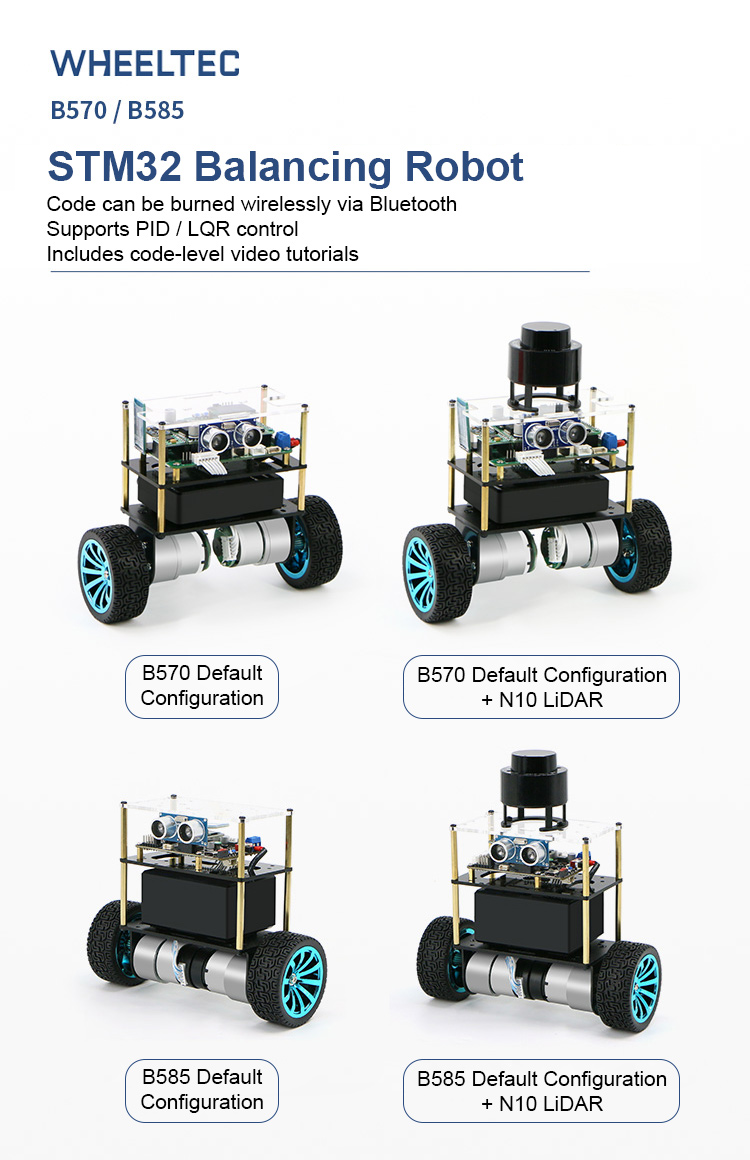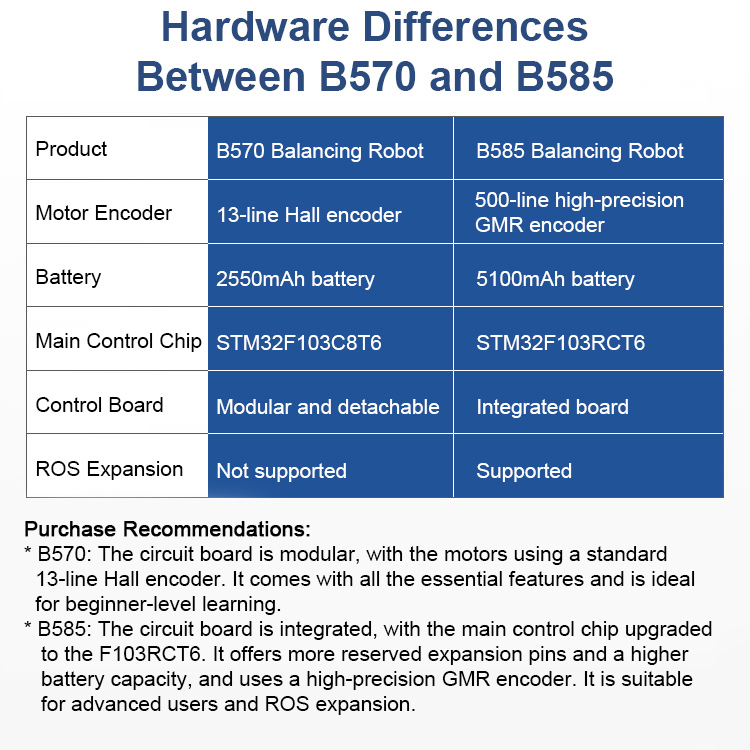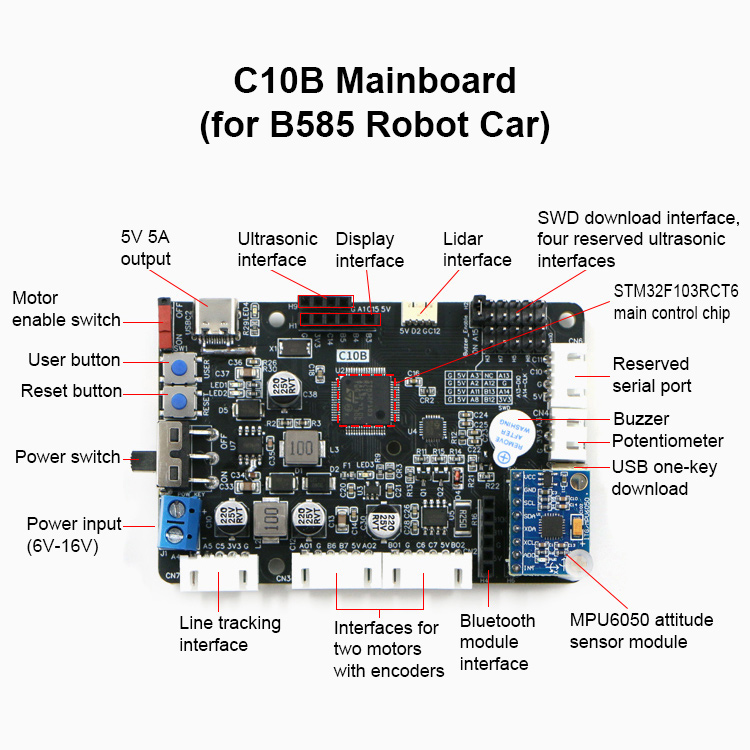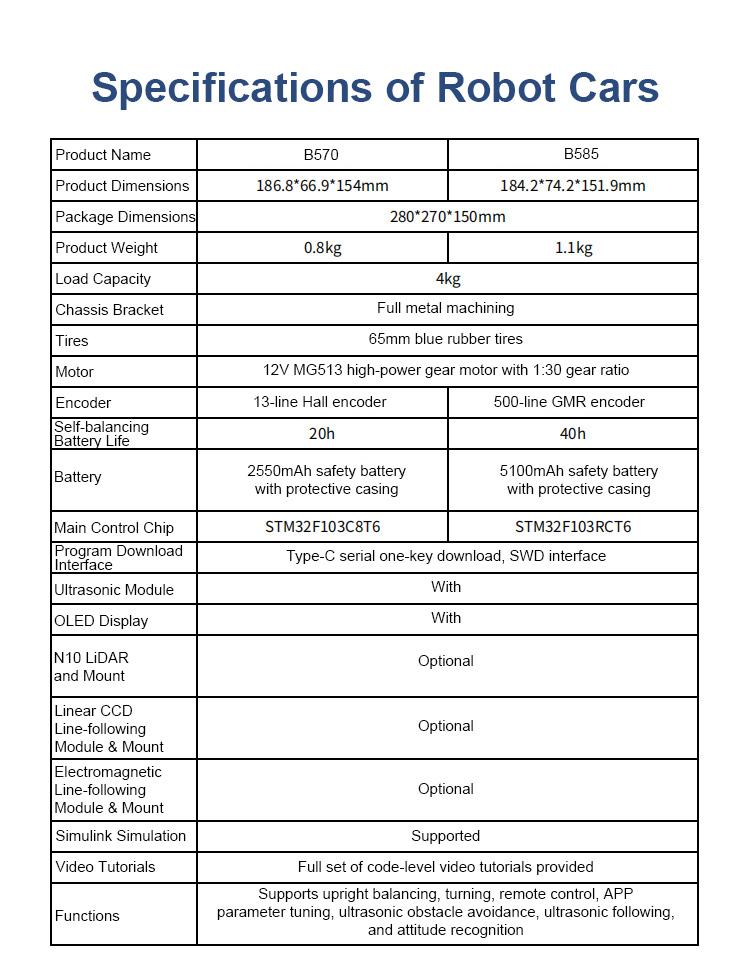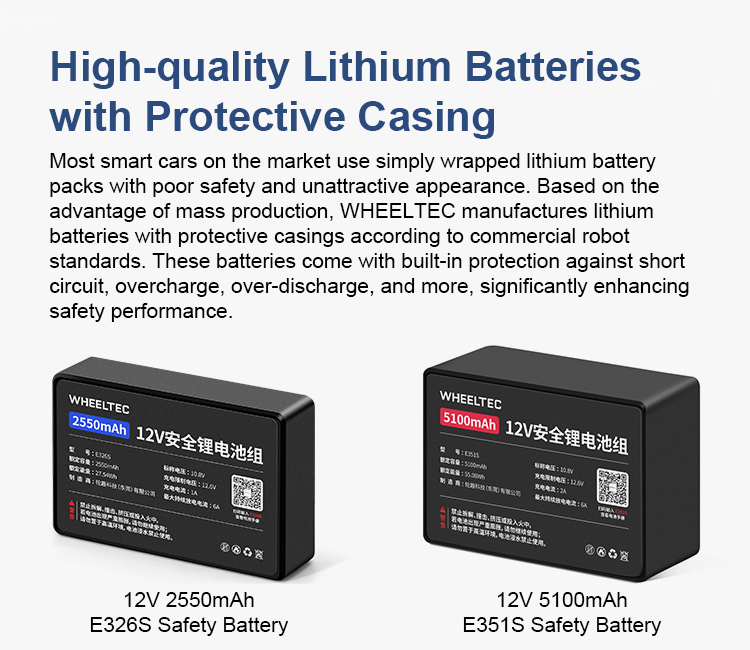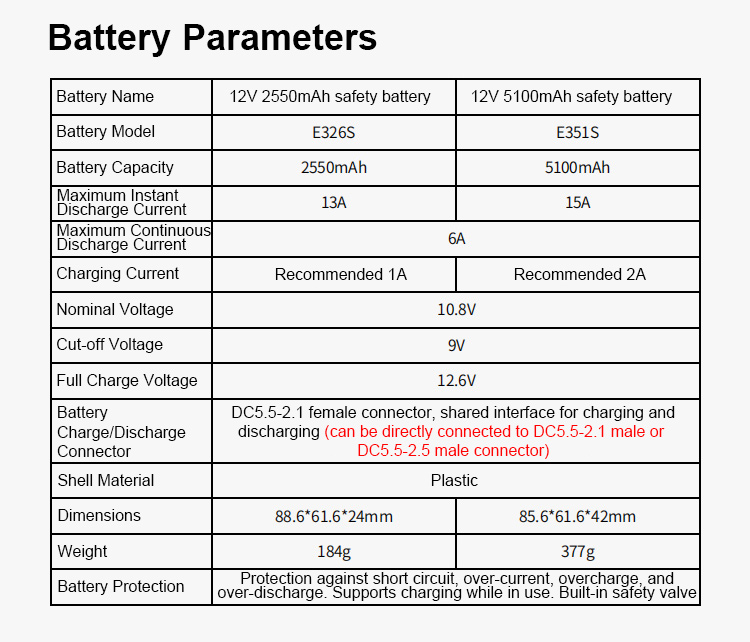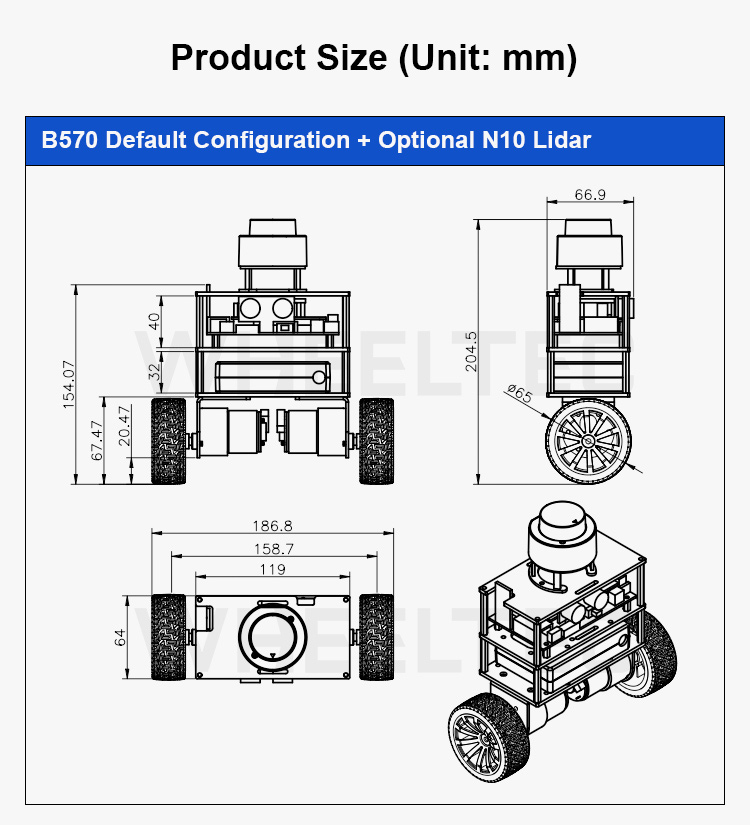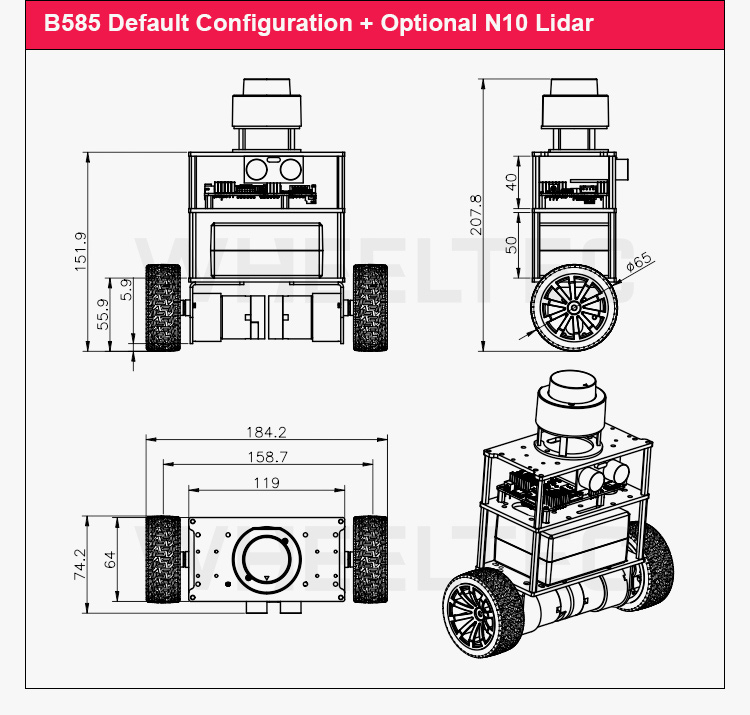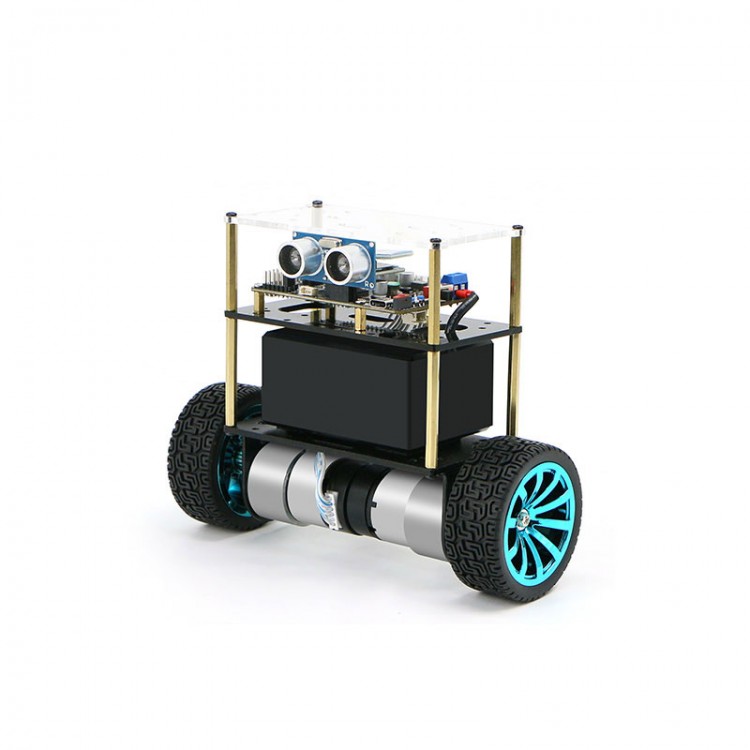
| Quantity | 3+ units | 10+ units | 30+ units | 50+ units | More |
|---|---|---|---|---|---|
| Price /Unit | $99.89 | $97.85 | $94.79 | $90.72 | Contact US |
 B570 Two-Wheeled Balancing Robot Car (Default Configuration) with Hall Encoder & 4KG Load Capacity
$82.40
B570 Two-Wheeled Balancing Robot Car (Default Configuration) with Hall Encoder & 4KG Load Capacity
$82.40
 WHEELTEC B585 DP2 Assembled Two-Wheeled Self-Balancing Robot 3KG Load Capacity (with N10 25m Lidar)
$205.89
WHEELTEC B585 DP2 Assembled Two-Wheeled Self-Balancing Robot 3KG Load Capacity (with N10 25m Lidar)
$205.89
 WHEELTEC B585 DP2 Assembled Two-Wheeled Self-Balancing Robot 3KG Load Capacity (without N10 Lidar)
$146.82
WHEELTEC B585 DP2 Assembled Two-Wheeled Self-Balancing Robot 3KG Load Capacity (without N10 Lidar)
$146.82
B585 Two-Wheeled Balancing Robot Car (Default Configuration) with GMR Encoder & 4KG Load Capacity
B585 Default Configuration:
Based on the B570, the B585 features an upgraded modular main control unit with enhanced expandability, an upgraded 5100mAh battery for superior battery life, and an upgraded GMR encoder for higher balancing control accuracy.
Advantages:
* AB Phase Encoder
* High-Power DC Motor
* Battery with Protective Casing
* Supports APP Parameter Tuning
* Supports Attitude Sensing
* Low Voltage Warning Function
* Ultrasonic Obstacle Avoidance
* Supports Obstacle Avoidance During Navigation
* ROS Expansion
* Code-Level Video Tutorials Provided
* Technical Support Available
* Control Algorithms: PID / LQR
* Mathematical Modeling: Detailed Mathematical Model Provided
* PID Learning: PID Learning Mode Available
* STM32 Low-Level Analysis: Module Routines and STM32 Low-Level Explanation Based on the Product
* Program Versions: Register / Standard Library / HAL Library
* Attitude Algorithms: Kalman Filter / Complementary Filter / DMP
* Tutorials: Full Series of Code-Level Video Tutorials on Motor / Balancing Car Principles, Complete Development Manual
* Battery: Lithium Battery Pack with Protective Casing
Features:
STM32 Balancing Robot
* Code can be burned wirelessly via Bluetooth
* Supports PID / LQR control
* Includes code-level video tutorials
High-Performance Balancing Car Chassis
* 3mm thick aluminum alloy with anodized sandblasted surface
* Equipped with high-power geared motors with AB phase encoders
Compatible with PID Speed and Position Closed-Loop Control Learning
* We provide dedicated source code and detailed tutorial documentation for learning PID control—from speed closed-loop control to position closed-loop control.
Mathematical Modeling Provided
* Mathematical modeling is an important tool in robot development. We provide a handbook of mathematical modeling results for this balancing robot to facilitate in-depth research and learning.
Posture Recognition
* When the robot is placed on the ground, it recognizes this action through algorithms and automatically activates the balancing system. When the robot is picked up vertically while upright, it uses its sensors to recognize this action through algorithms and automatically deactivates the balancing system. Users can master the operation simply by following our video tutorials. All algorithms are fully open-source.
Ultrasonic Obstacle Avoidance and Following Functions
* The B570 and B585 support both ultrasonic obstacle avoidance and following modes, allowing users to switch between them freely.
* The OLED screen displays the distance to the object in front.
* In obstacle avoidance mode, the car can steer away from obstacles ahead.
* In following mode, it can track and follow a leading object.
Supports Heavy Loads
* The self-balancing car features a metal chassis, making it easy to expand and DIY.
* Equipped with high-quality, high-torque motors, it can easily carry loads of up to 4 kg.
LQR Control Code Provided in Addition to Standard PID Control
* LQR (Linear Quadratic Regulator) is a control algorithm that achieves optimal system performance at low cost.
* It is widely used in intelligent control and autonomous driving applications.
* A Matlab Simulink simulation model for LQR control is also provided.
Provides Multiple Code Versions and Explanations to Meet the Learning Needs of Users at Different Levels
* WHEELTEC Self-Balancing Car Basic Code Version: It only retains the most basic functions of the self-balancing car. Recommended for beginners.
* WHEELTEC Self-Balancing Car Standard Library Function Version: A classic standard library code version. It includes the implementation of all product functions and is recommended for learning after the basics.
* WHEELTEC Self-Balancing Car HAL Library Version: HAL library is a more popular development method. The universal API interface allows all functions of the self-balancing car to be easily ported to different STM32 series products. Recommended after mastering the standard library, as it can greatly improve development efficiency.
* WHEELTEC Self-Balancing Car HAL Library CubeIDE Version: Also based on the HAL version, it is developed using the official CubeIDE environment. Recommended for users accustomed to the STM32CubeIDE development environment.
* WHEELTEC Self-Balancing Car Register-Level Version: It configures the chip's peripherals by directly operating the registers to achieve full functionality. Recommended for advanced users looking to level up.
Provides Three Angle Acquisition Algorithms
* The default program supports multiple angle acquisition algorithms, including DMP, Kalman, and Complementary filter. Among them, DMP is the driver engine built into the MPU6050, which can directly output angles. The other two algorithms obtain angles by filtering angular velocity and linear acceleration, and their data stability can meet the needs of balancing vehicles.
Detailed Code Comments and Online Source Code Explanation
* Users can easily read the code. If there are any questions during this process, they can get answers online anytime!
Bluetooth & Wi-Fi App Provided
* For Android and iOS
* Gravity-sensing control and dual-hand button remote control modes
* 5-channel waveform display interface: you can view waveforms at any time without a data cable.
* 9-channel parameter adjustment interface: it allows online tuning and parameter saving during power-off.
* Optimized low battery alert mechanism: APP accurately pushes low-voltage warnings to prevent battery over-discharge.
* Supports Bluetooth 4.0 module
* Note: It comes with a Bluetooth module. But the Wifi module is optional.
Comprehensive Monitoring of the Balancing Robot via APP
* Battery monitoring feature alerts users via APP when battery level falls below 30%.
* Simulated speed display using left and right encoders
* Real-time graphical display of the robot's tilt angle
* Real-time display of commands received by the robot's lower computer
* Real-time display of commands sent by the APP
Exceptional Remote Control Experience
* Gravity-sensing Control: It uses the phone's motion sensors to send control signals based on real-time orientation. Gravity sensitivity is customizable.
* Joystick Control: A classic control mode. Push the center circle in different directions to send commands. Ideal for one-handed use.
* Dual-hand Button Control: It simulates traditional RC car control using two fingers on the phone screen. The app sends corresponding commands.
Data Display via Waveforms in the App
* Supports up to 5 waveform display channels
* Customizable channel names
* Toggle individual channels on or off
* Axes auto-scale based on input values
* Multiple interpolation algorithms supported, including cubic Bezier
* Option to enable or disable real-time display of each data point
* Pinch-to-zoom gesture supported for waveform detail scaling
Real-Time Multi-Channel Parameter Tuning
* Supports real-time parameter tuning with data updates from the lower computer to the app. Up to 9 adjustable channels
* Power-down parameter saving supported for improved tuning efficiency
* Users can customize each channel's name, value, and adjustment range
PC-like Serial Debug Mode
* Includes a traditional PC-style serial debugging assistant
* Can receive data from and send data to the lower computer
* It operates in a "chat-like" format, allowing for customizable and interactive functions.
One-Click Download via Type-C Data Cable
* Supports one-click download feature
* Use a type-c data cable for program downloading and serial communication
Wireless Firmware Flashing via Bluetooth
* The built-in Bluetooth module not only supports remote debugging but also enables wireless firmware flashing via dedicated Bluetooth programming tool. The entire flashing process takes just seconds, greatly facilitating secondary development.
Modules of B585:
* C10B Mainboard: The mainboard is equipped with multiple protection features, including drive current detection and current limiting protection, thermistor overheat protection, and short circuit protection for the main control chip.
* OLED Display: Thanks to the 0.96-inch OLED display, users can conveniently and quickly view the car's data and perform real-time debugging.
* Ultrasonic Module: The ultrasonic module enables advanced balancing vehicle functions such as obstacle avoidance and following.
* MPU6050 Module: The MPU6050 chip integrates a gyroscope and accelerometer, and provides multiple angle acquisition algorithms, including DMP, Kalman filtering, and complementary filtering.
* Bluetooth Serial Module: The module can easily link to an app, enabling remote control of the car, vehicle tuning, waveform viewing, and other functions.
C10B Mainboard (for B585):
* It is designed for smart vehicles and ROS development. The mainboard is compatible with a wide range of popular robot chassis types including balancing robots, Ackermann-steering cars, differential drive vehicles, and tracked vehicles. Source code and tutorials are provided.
* The mainboard supports multiple control methods including game controllers, Bluetooth, CAN, and serial communication. It also offers a 5V 5A external power supply interface and a parallel input/output power interface. With the same dimensions and mounting holes as a Raspberry Pi, it can be seamlessly integrated into a ROS-based robot.
* Built-in protections include drive current detection with current limiting, thermistor-based overheat protection, and short-circuit protection for the main control chip.
High-Power Motors with GMR Encoders (for B585):
* The newly released GMR encoder combines the stability of traditional Hall encoders with the high precision of optical encoders. It meets both accuracy and stability requirements, making it especially suitable for high-precision navigation scenarios such as ROS robots.
Motor Specifications:
* Rated Voltage: 12V
* Stall Current: 3.2A
* Rated Current: 360mA
* Gear Ratio: 1:30
* Stall Torque: 4.5 kg·cm
* Rated Torque: 1 kg·cm
* Rated Power: Approx. 4.32W
* Speed Before Reduction: 11,000 rpm
* Speed After Reduction: 366 ± 26 rpm
Advantages Compared to Polymer Batteries:
* The 18650 battery cell is equipped with a built-in explosion-proof valve. When the pressure becomes too high, the valve protrudes, and the top fuse melts to release the pressure. In contrast, polymer batteries will continuously swell and bulge under high pressure, with a risk of rupture and explosion. The 18650 battery has more than 800 charge-discharge cycles before a 20% degradation, and its theoretical service life can exceed 3 years.
Documentation Information:
* We can provide English resources, including source code with English comments, English documentation, and video tutorials with English subtitles. Please contact customer service after purchasing the product if needed.
Packing List:
* 1 x Set of Robotic Car
Packaging Details:
* Weight: 1.3kg
Note:
* The robotic car has been assembled and is ready to use.
* Wifi module is optional.